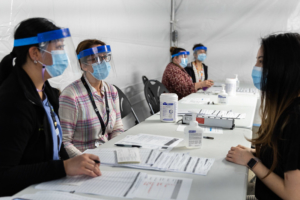The Necessity of Vaccine Diplomacy
 While the COVID-19 vaccine has helped to reduce destruction and devastation from the pandemic, the virus is still spreading across the globe. According to Dr. Peter Hotez “organized hostility against the scientific community,” may be public health’s biggest enemy. However, on a global scale, the most serious threat is the lack of vaccine diplomacy and effective health care in geopolitics. Solving this crisis requires the United States and other western countries to prioritize the distribution of pandemic response resources so that everyone can lead healthy, safe lives regardless of their location.
While the COVID-19 vaccine has helped to reduce destruction and devastation from the pandemic, the virus is still spreading across the globe. According to Dr. Peter Hotez “organized hostility against the scientific community,” may be public health’s biggest enemy. However, on a global scale, the most serious threat is the lack of vaccine diplomacy and effective health care in geopolitics. Solving this crisis requires the United States and other western countries to prioritize the distribution of pandemic response resources so that everyone can lead healthy, safe lives regardless of their location.
Inequities of Vaccine Resources
The COVID-19 pandemic has increased the global death rate by 20%, shut down economies and dismantled health care systems across the world. Despite the fact that the COVID-19 vaccine is now readily available in many developed countries, many low-income countries remain highly unvaccinated while the United States eases pandemic funding. With monkeypox cases on the rise, the fight against global health crises has hit a major roadblock, as low-income countries are scrambling for vaccine resources amid slowing economies.
Developed countries have a humanitarian responsibility to ensure that low-income countries have access to the healthcare resources that North American and European countries have. Additionally, novel variants of COVID-19 often arise from unvaccinated populations, which means that the pandemic will only worsen unless we make a concerted effort to fully vaccinate developing and low-income countries, according to Dr. Hotez.
Making a Commitment to Vaccine Diplomacy
Today, less than 20% of people in low-income countries have received their first dose of a COVID-19 vaccine. The next step is for the United States and other world leaders to provide more resources to help get shots into people’s arms in developing countries. According to The Borgen Project’s action center, “This essential funding will go towards vaccines, tests, last-mile efforts and treatment so we can continue vaccinating the rest of the world, save lives and prevent new variants from emerging.” It’s an important investment that will not only save the lives of people in the most vulnerable places across the globe but will also help to protect the well-being of Americans.
Overall, vaccine diplomacy is also necessary to conquer vaccine skepticism, which is keeping millions of people from getting vaccinated. In order to effectively fight against the worsening global health crisis of COVID-19 and monkeypox, the United States and other economic powerhouses should prioritize geopolitical cooperation with developing countries to collaborate on equitably distributing vaccine resources.
– Ella DeVries
Photo: Flickr
